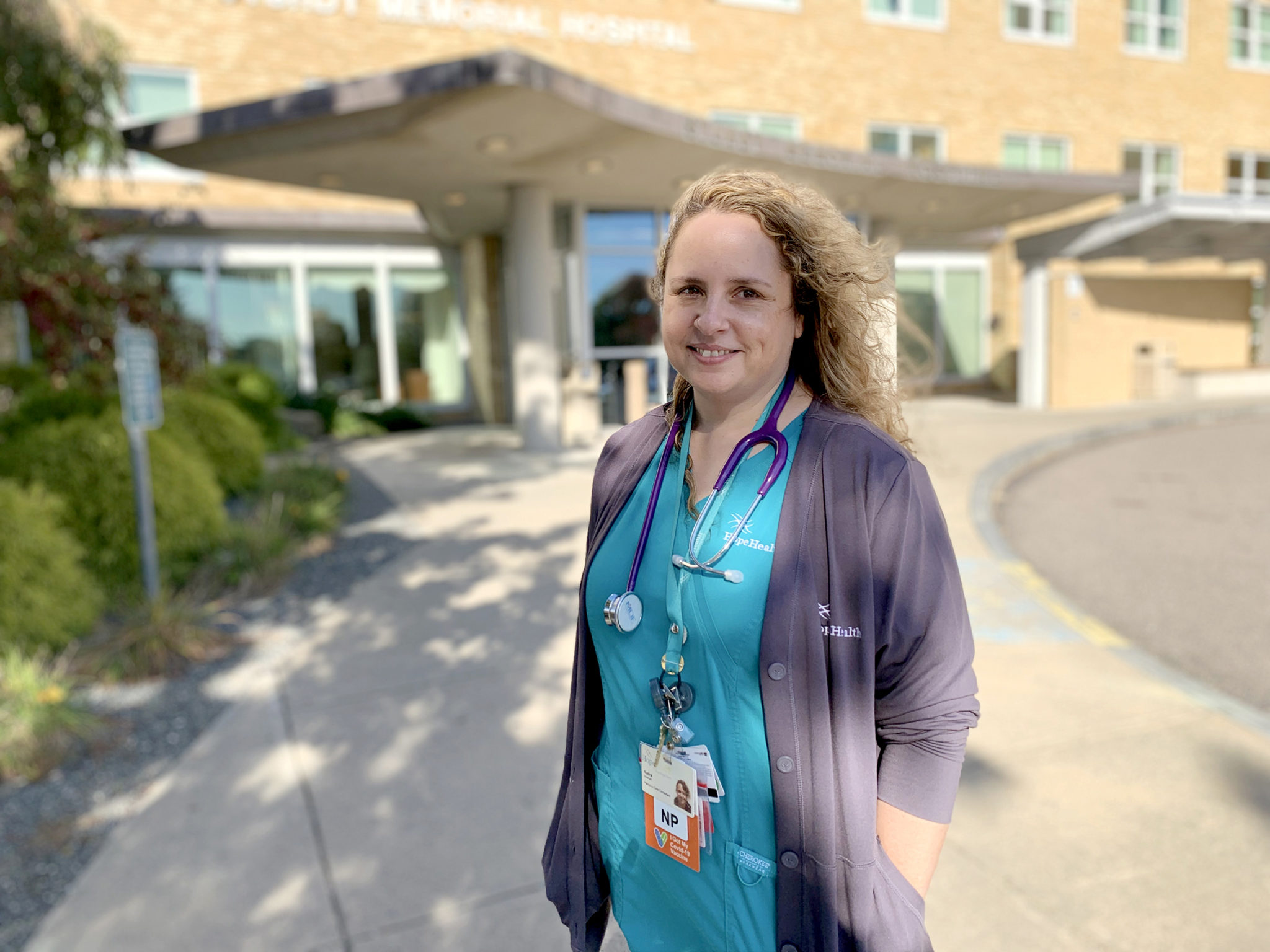The woman in the hospital bed was weak and very confused. She was in her 80s and had recently had a fall so a physician ordered a brain scan to look for a skull fracture. She didn’t have one. She also didn’t have pneumonia.
It’s not uncommon for hospitalized patients with serious illness to present with a puzzling list of symptoms. Finding a diagnosis often takes extra time and attention, which can sometimes be a challenge.
Nurse practitioners can play a big role in cases like this one. HopeHealth Palliative Care Consultant Audra Noonan, APRN, ACHPN, who is a nurse practitioner, was a member of the care team that provided care for this woman. She spent time talking with the woman’s family and remembered something the daughter had said.
“She just kept telling me her mother was nauseous and she hadn’t been eating for quite some time,” Audra says.
Audra suggested a scan of the woman’s abdomen. The hospitalist—a doctor who specializes in treating patients while they are in a hospital—also thought it was a good idea and agreed. A scan showed the woman had cancer that had spread. Although the news was bad, the woman’s family finally had some answers and could start to prepare themselves for what was ahead.
“That one particular thing helped the family to at least wrap their head around what was going on,” Audra says.
Consultants and collaborators
HopeHealth has about 20 NPs who work in a variety of settings in Massachusetts and Rhode Island. Some, like Audra, primarily work in hospitals while others see patients in nursing homes, outpatient clinics, assisted living facilities, the patients’ own homes or a mix. These NPs quickly become part of care teams and are relied upon to help lead difficult discussions and make patients more comfortable.
“Medical/surgical teams consult us in order to help with complex symptom management and/or to help facilitate goals of care discussions with patients and families,” says HopeHealth Manager of Nurse Practitioners Kaitlin Collins, NP, ACHPN.
HopeHealth NPs are highly skilled at estimating how much time a palliative care patient has left as their condition declines. When Audra enters a patient’s room or a family room at the hospital where she works, she is there to listen, share information and make recommendations so her patients and their families can make decisions about treatment options.
“My conversations could be an hour, they could be 30 minutes, they could be two hours,” Audra says.
“I’m going to spend as long as it takes with that family even if it’s multiple conversations to be able to get them the information they need. If there’s something that I do not know, I will find the answer to it and maybe that means asking a physician.”
Communication is key
Good NPs have advanced communication skills as well as tenacity, integrity, empathy, and the ability to collaborate with others. As palliative care embraces physical, emotional, social, and spiritual needs, collaboration works best when care is coordinated with other professionals, including social workers and chaplains, to ensure the needs of patients and their families are being met.
“Communication with other care team members is essential,” Kaitlin says. “My first stop when assessing a patient is always the bedside nurse.”
HopeHealth’s palliative care NPs include experts in wound care, pain management and oncology to name a few specialties. They stay in touch often and learn from each other.
“We’re constantly phoning a colleague, zooming, and even getting together when the timing is right,” Kaitlin adds. “We come from diverse backgrounds and each of us brings a wealth of knowledge in certain areas.”
HopeHealth NPs aim to help people with serious illness live as long and as well as possible and support their families in making both medical and non-medical decisions.
“Sometimes patients want things that the medical system doesn’t think are realistic,” Audra says. “Sometimes they are, and sometimes they aren’t. You need to understand the why of the patient.”
Side effects to consider
Audra says 90% of her job is education, teaching patients and families about how a disease progresses, the benefits of treatment and the risks involved.
“Everything in medicine has a side effect, and often times side effects outweigh benefits,” she says. “When I’m talking to family members about a patient who’s declining, there’s a number of things that could happen that are likely to cause more decline. I try to talk to families about planning for the worst but hoping for the best.”
“You need to understand the why of the patient.”
Audra finds out from a family what they understand about their loved one’s condition so she can give them information in a way that will make sense to them.
“When I look at patients who are doing poorly, I look at the things that we can do medically,” Audra says. “Many times, the things we can do medically can create suffering. No family wants to see their loved one suffer.”
Adds Audra: “I always think, ‘What would I want to know if it were my loved one?’ Keeping that in perspective for myself helps me manage my emotions. Because that’s what the family needs from me.”
National Nurse Practitioner Week is November 7-13, 2021. Learn more about how to get started with a palliative care nurse practitioner here.
Above photo: HopeHealth Palliative Care Consultant Audra Noonan, APRN, ACHPN, is based at a hospital but tracks the progress of her patients after discharge to their home or a home long-term care facility.

